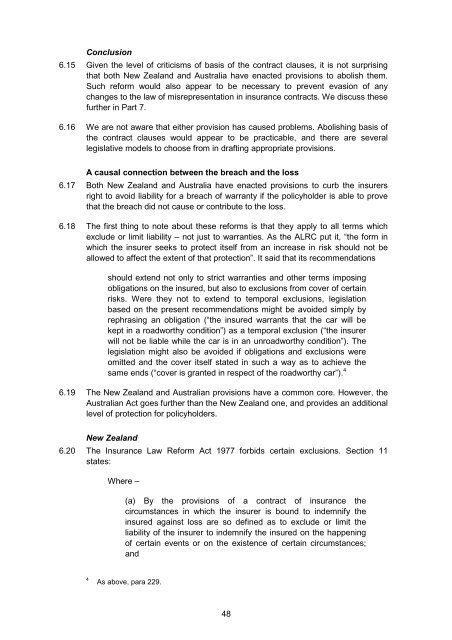Insurance Contract Law Issues Paper 2 Warranties - Law Commission
Insurance Contract Law Issues Paper 2 Warranties - Law Commission
Insurance Contract Law Issues Paper 2 Warranties - Law Commission
Create successful ePaper yourself
Turn your PDF publications into a flip-book with our unique Google optimized e-Paper software.
Conclusion<br />
6.15 Given the level of criticisms of basis of the contract clauses, it is not surprising<br />
that both New Zealand and Australia have enacted provisions to abolish them.<br />
Such reform would also appear to be necessary to prevent evasion of any<br />
changes to the law of misrepresentation in insurance contracts. We discuss these<br />
further in Part 7.<br />
6.16 We are not aware that either provision has caused problems. Abolishing basis of<br />
the contract clauses would appear to be practicable, and there are several<br />
legislative models to choose from in drafting appropriate provisions.<br />
A causal connection between the breach and the loss<br />
6.17 Both New Zealand and Australia have enacted provisions to curb the insurers<br />
right to avoid liability for a breach of warranty if the policyholder is able to prove<br />
that the breach did not cause or contribute to the loss.<br />
6.18 The first thing to note about these reforms is that they apply to all terms which<br />
exclude or limit liability – not just to warranties. As the ALRC put it, “the form in<br />
which the insurer seeks to protect itself from an increase in risk should not be<br />
allowed to affect the extent of that protection”. It said that its recommendations<br />
should extend not only to strict warranties and other terms imposing<br />
obligations on the insured, but also to exclusions from cover of certain<br />
risks. Were they not to extend to temporal exclusions, legislation<br />
based on the present recommendations might be avoided simply by<br />
rephrasing an obligation (“the insured warrants that the car will be<br />
kept in a roadworthy condition”) as a temporal exclusion (“the insurer<br />
will not be liable while the car is in an unroadworthy condition”). The<br />
legislation might also be avoided if obligations and exclusions were<br />
omitted and the cover itself stated in such a way as to achieve the<br />
same ends (“cover is granted in respect of the roadworthy car”). 4<br />
6.19 The New Zealand and Australian provisions have a common core. However, the<br />
Australian Act goes further than the New Zealand one, and provides an additional<br />
level of protection for policyholders.<br />
New Zealand<br />
6.20 The <strong>Insurance</strong> <strong>Law</strong> Reform Act 1977 forbids certain exclusions. Section 11<br />
states:<br />
Where –<br />
(a) By the provisions of a contract of insurance the<br />
circumstances in which the insurer is bound to indemnify the<br />
insured against loss are so defined as to exclude or limit the<br />
liability of the insurer to indemnify the insured on the happening<br />
of certain events or on the existence of certain circumstances;<br />
and<br />
4 As above, para 229.<br />
48

















